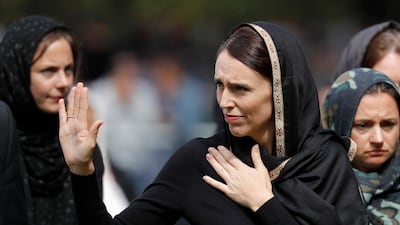A wave of solidarity has swept through New Zealand in the wake of the country’s worst terrorist attack last week.
Thousands of non-Muslim women across the country, many with little previous exposure to Islam, posted pictures of themselves wearing headscarves – typically worn by some Muslim women to denote modesty.
The move sparked both sympathy and controversy.
On March 16, the day after the attack in which 50 people were killed, Prime Minister Jacinda Ardern touched down in Christchurch wearing a black veil, in a show of support for the Muslim community.
Later that week she spoke at the memorial – again, her hair tucked away beneath a black veil. “New Zealand mourns with you. We are one,” she said.
Across the country, women followed suit. From news presenters to police officers, some wore them to work, others to memorials, their images circulating widely on social media.
Residents mobilised on Facebook, setting up groups such as Scarves in Solidarity and Headscarf for Harmony, and calling on women to cover their hair in a symbolic show of solidarity.
In Auckland, a doctor asked women to wear headscarves after a Muslim woman said she had been too scared to leave her home in her hijab.
“I wanted to say – we are with you, we want you to feel at home on your own streets, we love, support and respect you,” said Dr Thaya Ashman.
But what began as a call for solidarity also fuelled a heated debate on social media.
Some have labelled the move tokenism, while others have argued it represents a patriarchal symbol of oppression and control that some women have fought tooth and nail to end.
“I consider those victims as humans. But the people that consider them only Muslims, wear the hijab for solidarity” novelist Taslima Nasreen said in reference to the 50 people killed in the Christchurch attack.
Canadian human rights activist Yasmine Mohammed said on Twitter that wearing a hijab was a highly charged issue: “One reason being that the hijab is not a universal symbol for Muslims”.
The west, she said, had “fetishized” the hijab “because they don’t have to wear it”.
The Washington Post Beijing bureau chief Anna Fifield, who reported on the attacks from Christchurch, wore a headscarf to the Friday prayers.
“I’m not pro-hijab or anti-hijab. I’m pro-choice,” she said. “I chose to wear hijab to Friday prayers in the park because it felt like the right, respectful thing to do. Just as I have worn hijab to Friday prayers the Mideast, just as I wore a suit jacket to interview Japanese bureaucrats”.

Mehpara Kahn – a victim of Islamophobia – referred to the headscarf as a religious symbol, deserving of "a degree of understanding and respect, otherwise it does become a token gesture.”
“When those that have protected and served our community wear it, it was a powerful gesture, because they will continue to protect and serve our community,” she said.
Ms Kahn said she hoped the women who had chosen to wear the hijab would continue to stand up for Muslim women’s right to wear it daily.
Chair of the Australian Muslim Women's Centre for Human Rights Tasneem Chopra described the debate as “innocuous”.
"I see people trying to show solidarity in the immediate aftermath of a horrific tragedy; it's a gesture of good will, not cultural appropriation. There's nothing wrong with it," she told The National.

